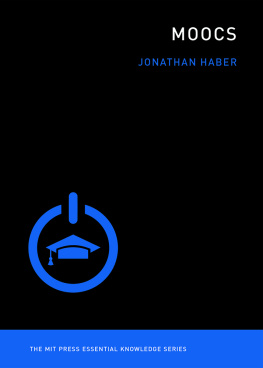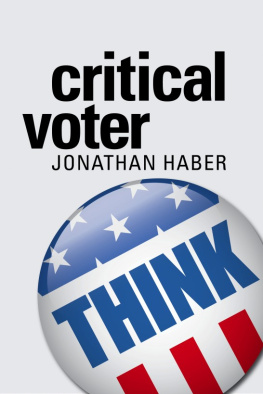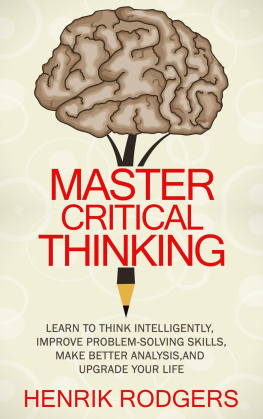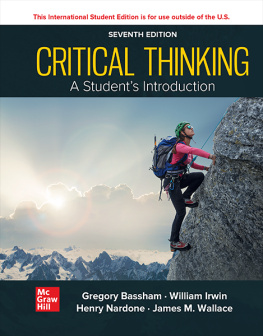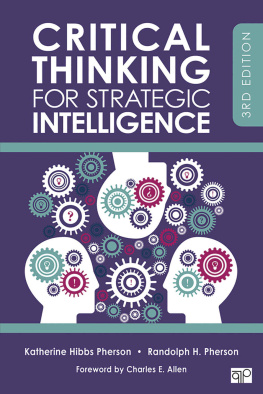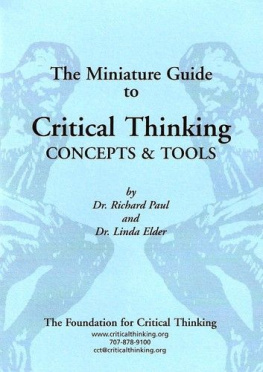Critical Thinking

The MIT Press Essential Knowledge series
A complete list of the titles in this series appears at the back of this book.
Critical Thinking
Jonathan Haber
The MIT Press | Cambridge, Massachusetts | London, England
2020 Massachusetts Institute of Technology
All rights reserved. No part of this book may be reproduced in any form by any electronic or mechanical means (including photocopying, recording, or information storage and retrieval) without permission in writing from the publisher.
This book was set in Chaparral Pro by Toppan Best-set Premedia Limited.
Library of Congress Cataloging-in-Publication Data is available.
ISBN: 978-0-262-53828-2
10 9 8 7 6 5 4 3 2 1A
To Mom and Dad
for teaching me to think
Contents
Series Foreword
The MIT Press Essential Knowledge series offers accessible, concise, beautifully produced pocket-size books on topics of current interest. Written by leading thinkers, the books in this series deliver expert overviews of subjects that range from the cultural and the historical to the scientific and the technical.
In todays era of instant information gratification, we have ready access to opinions, rationalizations, and superficial descriptions. Much harder to come by is the foundational knowledge that informs a principled understanding of the world. Essential Knowledge books fill that need. Synthesizing specialized subject matter for nonspecialists and engaging critical topics through fundamentals, each of these compact volumes offers readers a point of access to complex ideas.
Bruce Tidor
Professor of Biological Engineering and Computer Science
Massachusetts Institute of Technology
Preface
In a 2009 address focusing on national education policy, President Barack Obama issued this challenge:
Im calling on our nations governors and state education chiefs to develop standards and assessments that dont simply measure whether students can fill in a bubble on a test, but whether they possess 21st century skills like problem-solving and critical thinking and entrepreneurship and creativity.
A manifestation of this national priority was the Common Core, a set of language and math standards initially implemented in forty-six US states, standards that prioritize developing the critical-thinking, problem-solving, and analytical skills students will need to be successful.
Two decades earlier, President George H. W. Bush announced his administrations America 2000 educational initiative, which expressed the following objective as part of Goal 5: Adult Literacy and Lifelong Learning: that The proportion of college graduates who demonstrate advanced ability to think critically, communicate effectively, and solve problems will increase substantially.
These national education priorities, and other initiatives and research projects that stretch back more than a century, stress the importance of critical thinking, a type of thinking with characteristics distinct from general intelligence or intellectual virtues such as thoughtfulness and wisdom.
Today, educators and educational reformers across the globe regularly announce that rote learning must give way to the nurturing of critical thinkers, the very type of people in highest demand by employers.
This was illustrated in a 2013 research report by the Association of American College and Universities, which indicated that More than 75 percent of [employers] surveyed say they want more emphasis on five key areas including: critical thinking, complex problem solving, written and oral communication, and applied knowledge in real-world settings.
In 2018, the Organization for Economic Co-operation and Development (OECD), an international economic development body made up of the worlds most economically advanced nations, began a project to study how critical thinking can be taught and assessed in support of a growing consensus that formal education should cultivate the creativity and critical-thinking skills of students to help them succeed in modern, globalised economies based on knowledge and innovation.
Global economic changes favoring individual innovation over mass production have also triggered interest in
Beyond economics, our political debates about fake news and other hot-button topics imply the importance of reasoning skills that allow us to find truth and make informed decisions. One fallout from the 2016 US presidential election was a sense of crisis regarding voters ability to make choices through reason rather than through the emotional judgments and/or tribalism that characterize so much of US and world politics today.
As these examples show, in todays world critical thinking has taken on a prominent role in global educational debates and the goal of creating critical thinkers now informs major initiatives such as the development of nation-spanning academic standards. One might even assert that acquiring and applying this skill is vital to our survival as a society, if not a species. That said, I wonder how many people, if asked, could answer this question: What is critical thinking?
My own attempt to answer the question has been informed by a range of experiences, including work with employers on techniques to assess and measure a curriculum and set of related teacher resources that used the 2012 presidential election to teach many of the critical thinking skills described in this book such as logic, argumentation, language skills (including persuasive communication), and controlling for biases.
Before releasing Critical Voter to wider audiences, its precepts were tested through prototype lessons taught to my own children, one of whom will have started college by the time this manuscript is completed.
My son being in college might not necessarily be good news critical-thinking wise. According to Richard Alum and Josipa Roska in their popular 2011 book Academically Adrift, gains in critical thinking, complex reasoning, and writing skills (i.e., general collegiate skills) during the first two years of college are either exceedingly small or empirically nonexistent for a large proportion of students.
The impact of Academically Adrift on discussions and debates about higher education, in both the academic and popular press, demonstrated general acceptance that a world without critical-thinking skills is a world to be feared. But why might this be so?
Built into the conversation about critical thinking taking place in the academy and among the wider public is an assumption that knowledge alone cannot help us solve the problems we face as individuals and as a society.
In the last few decades we have seen rapid acceleration in the creation of new knowledge coupled with unparalleled access to information through digital devices that are our constant companions. Yet errors in judgment continue to plague us at the individual and societal levels.
Worse, our inability to evaluate the information contained in our myriad pocket Libraries of Alexandria in terms of its veracity and credibility means we are just as likely to believe false information and draw incorrect conclusions from such facts, some of them fed to us by those who understand the flaws in human reasoning well enough to manipulate us.
Some commentary on the 2016 US election concluded that many Americans make decisions based on emotion rather than reason, implying that the publics ability to think critically does not exist or is easily short-circuited. But one need not look to national politics to see problems associated with lack of critical thinking. How many impulsive purchases, bad career choices, needless arguments with loved ones, and other personal problems might be avoided if we could train our minds to locate and evaluate evidence, place it into a structure for analysis, and base our choices on rules that have informed sound judgment since the days of Socrates and Aristotle?


